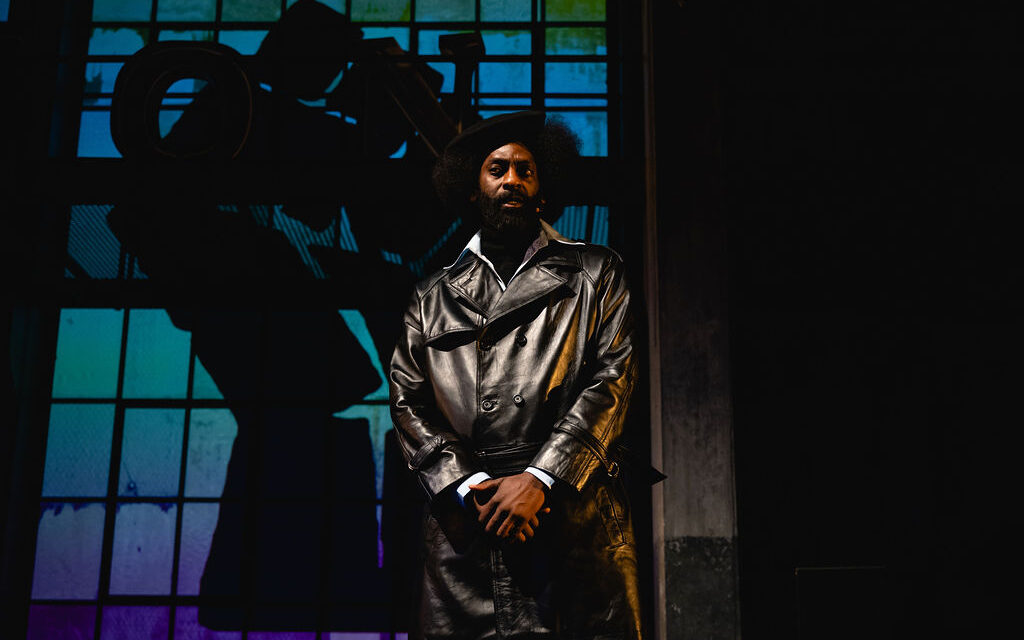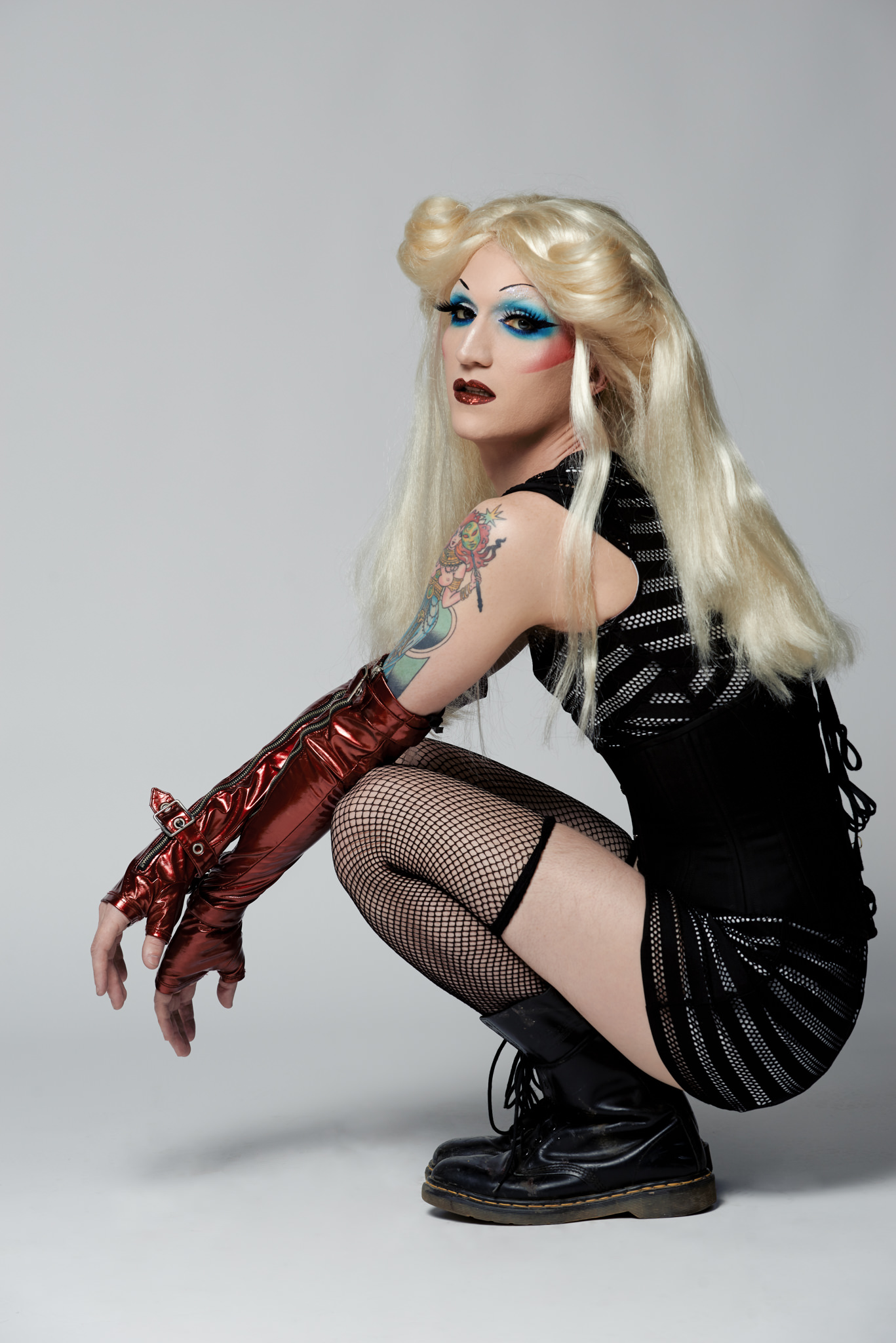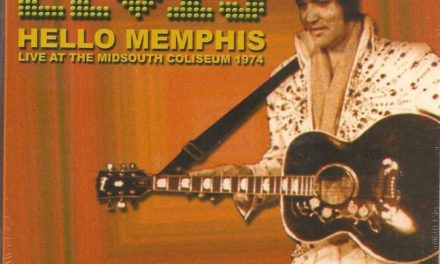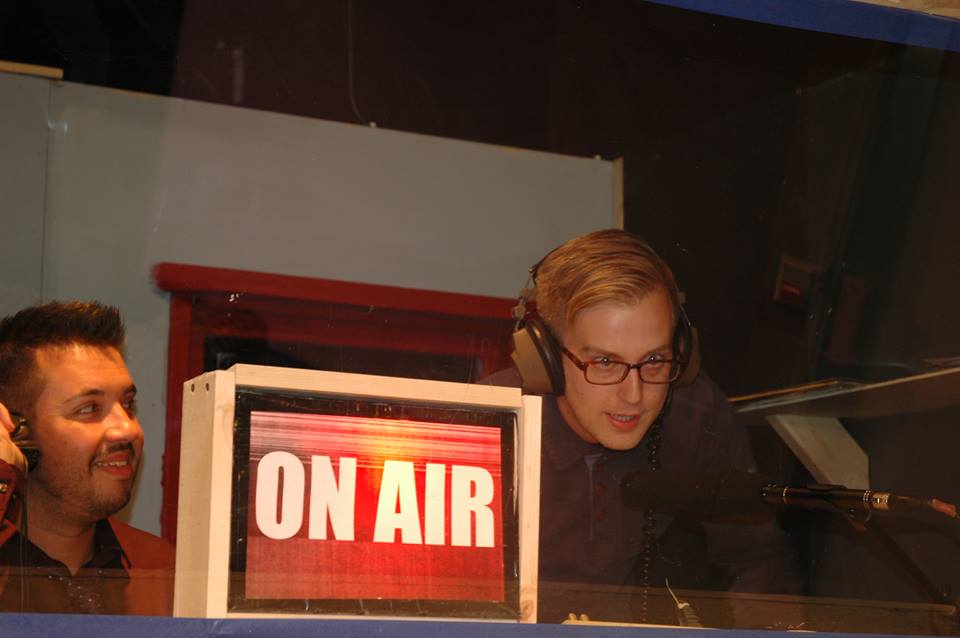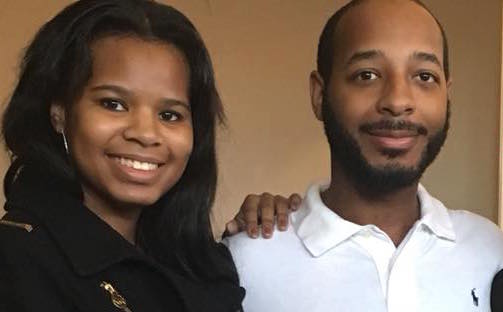Nate John Mark in Party People. Photo: Jon Cherry
Party People
By Universes (Steven Sapp, Mildred Ruiz-Sapp, and William “Ninja” Ruiz)
Directed by Steven Sapp
A review by Lance G. Newman II
Entire contents are copyright © 2023 by SpreadLovEnterprise. All rights reserved.
“You can silence the revolutionaries’ theater, but you can’t silence the theater of revolution.”
Today is Friday, April 7th, 2023. ‘Good Friday’ to some and the end of spring break for parents. For me it was another day in the life of a working-multidisciplinary artist. My day consisted of modeling for an upcoming fashion show for a news segment; going to a commercial audition; attending the opening of an art exhibition featuring dozens of black visual artists in Louisville; and I topped the evening off with a viewing of ‘Universes’ demonstration entitled Party People.
“–Demonstration? Dad, this was at Actors Theater of Louisville! There was a stage with hidden entrances; there were omnidirectional earpiece microphones and sophisticated lighting cues. There was music and choreography and poems and SINGING! There was technology integrated within the performance and the set. It was literally, a LIT play! What do you mean it was a demonstration?!”
Sorry reader, that’s my eleven year old daughter, I made her go with me since she’s out of school. Also before you plan an outing with your preteen, know that this show does not use ‘frick’ ‘freakin’ or any other euphemisms in place of more flavorful words. The language used is very much the language of youth organizers in the 60s and 70s. If you’re a squeamish parent that shields your children from aspects of reality, this is not the show for your kids. But I’m not that type of parent.
Yes, Party People was chock full of every exciting aspect we see in popular theater. Fun, rhythm filled verses, strong singing voices, illustrative choreography, memorable solos, great prop and light work, and an imaginative use of multimedia devices to carry the piece’s narrative along. But to call Party People a mere play doesn’t do the content, nor the context of this creation… justice, Justice, JUSTICE!
“–Haha, dad, that’s how they started the play… I mean “demonstration.” You still haven’t said why you call it that.”
Well, “Demonstration” has two definitions. The first is the action or process of showing the existence or truth of something by giving proof or evidence. The other is a practical exhibition and explanation of how something works or is performed. I believe Universes personified these descriptions fully with this dialogue of liberation.
I’ve read other reviews and they seem to run through the show chronologically. Naming characters, describing individual and group performance numbers, and generally giving a good feel of the plot. I intend to do all these things as well, but please know, the information nestled within this portrait is dense. I’m talking ‘took me years of independent study,’ dense. I couldn’t write down the references fast enough.
“–Dad, dad, tell them about the opening poem, where the woman was talking to her dad in jail. I don’t know what I’d do if you went to jail.”
“Well start imagining, because daddy’s still a revolutionary baby.”
The show opens with a solo poem from our co-protagonist, Malika played by Asia Mark. Parts of this piece were delivered to the audience, but a large amount was given to a live camera on stage with the feed being displayed on monitors facing the audience. This dynamic use of technology gave us two perspectives to indulge in. One perspective is of the child who grew up without a parent and the other, a parent who is helpless to the needs of their child. Malika’s father was a member of the Black Panther party and we get the sense that he is a political prisoner. Instantly, we as an audience are asked to consider the lives of the children of the revolution. This theme is restated later in the play when we’re introduced to a mother daughter dynamic in real time, but I don’t want to give away too much this soon.
Our other protagonist, Jimmy “Primo” played by William Ruiz, gives us our exposition delivered by a funky freestyle. This story follows two children of revolutionaries. One, a second generation Black Panther and the other, a second generation Young Lord. Each bonding over the fact that their elders do not consider them party members. “You ain’t no black panther!” Despite their feigned relationship, our protagonist pushes forward in putting together a reunion of sorts. A party slash showcase slash art exhibition honoring the work and legacy of their parents’ former comrades.
These comrades were members of the ‘Rainbow coalition.’ The coalition was started in 1969 by Fred Hampton, chairman of the Chicago Black Panther Party; William ‘preacherman’ Fasperman of the Young Patriot Organization; and José Cha Cha Jiménez, founder of The Young Lords. The coalition was later joined by Students for a Democratic Society (SDS), the Brown Berets, the American Indian Movement and the Red Guard Party.
This series of events was narrated by a documentary style video interviewing the various members individually preceded by a great period piece song and dance packed with historical background. Again, incorporating multimedia served as a great narrative framing tool. Party People’s timeline jumped from the present to the past at various times. Costumes and musical selection aided well in this effort and one can see the attention to detail given the context of the piece.
“–Dad, who was that one woman in the Young Lords? She could SANG! Like some people can sing, but she can SANG you know what I mean?”
My daughter is talking about the character Helita played by Mildred Ruiz-Sapp and yes indeed, she can sang. Very soon, you realize that everybody in the cast really does have a good voice. More importantly, everyone’s voice fits perfectly with their characters. We’re introduced to each character in various ways. The dialogue was sparse but I like my musicals like that. Give me song and dance and let the talking be Interludes to the album of an idea.
I remember noticing the intergenerational nature of the show. The audience I sat in reflected the same characteristics. A show about revolutionaries watched by revolutionaries. I’m inclined to say ‘former’ but there’s no sleeping once you’ve been awakened. One does not develop ideologies of good and abandon them. A revolutionary may fall estranged due to failed relationships with people in the revolution but they are revolutionary through practice. Every decision made in their daily lives is made with the revolution in consideration. I think this was one of the overall themes of UNIVERSES piece.
Honestly, I’ve said the word ‘revolution’ far too much in this review already. Surely, it will be flagged by some NSA new hire to analyze and disseminate. I can’t worry though, I know my name and picture was put on a bulletin board at 16 after winning a citywide poetry slam using a political poem I wrote called “The Representative.” If you ask nicely I’ll recite it for you later. I say all this to bring up another well presented theme of Party People, reasons.
There are many reasons liberation movements of the 60s and 70s failed in their efforts of improving conditions for the proletariat. One of those well known reasons is federal interference through programs that were intentionally created to cause havoc in liberation organizations. Paid informants, blackmailing tactics, and assassinations were all tools used by the government to ‘prevent the rise of a black messiah.’ This tragedy was realized by a prop door made to look like the door of Fred Hampton after authorities shot and killed him in his sleep.
“–Yeeeeeah, I did not like all the torture and shootings and death and stuff. It’s like they were singing and rapping happily about the saddest things.”
I mean, its torture baby girl. Speaking of which, Party People did not shy away from the internal reasonings for the liberation movements failed attempt.
From party members marrying agents to agents posing as party members interrogating and torturing other party members. This theme was personified in the character Omar, played by Nate John mutha(*******) Mark! The brother did a beautiful job in portraying the wronged party member traumatized and betrayed by his loyalty. From his dialogue to his song to his cries of pain, Mack’s performance was stellar, believable and eerily relative. There are many Uncle Omars in black families across america.
Another reasoning for the party’s internal bleeding was misogyny, masochism, and patriarchy.
“–The master’s tools will never dismantle the master’s house.” Audre Lorde wrote that.”
How did you know that?
“–You told me dad. Duh. Oo, are you telling them about the all women musical number? How’d it go? (thinks) “Something, something ruined the revolution’ there was so much going on, I couldn’t focus, but I remember I was cringing a little cause I could never do those movements on a stage. Yikes.”
Yes, the song went something like ‘pussycats ruined the revolution’ and it was exciting and informative in explaining how misogyny ran rife in liberation organizations. This subtheme was called out in musical fashion performed by the women of the cast. Strong voices like Sophia Ramos as Maruca and Angelica Santiago as Clara, were pleasantly paired with the seasoned, melodic tones of Robin McGee as Amira and Robynn Rodriguez as Donna. Rodriguez also gives a convincing performance as the wife of a police officer killed during the conflicts. A perspective rarely acknowledged when we talk about the collateral damage of the revolution.
I’d be remiss if I didn’t mention the OG characters of this demonstration. Blue, husband to Amira, played by Michael A. Shepherd was familiar, warm, and an awesome compliment to the more aggressive Omar. Also, I am here to tell you that Michael was MOVING! Dancing, running, climbing, I was impressed. Tito, the tio or uncle of our male protagonist, played by JL Rey also provided emotional layers to the story from interactions with past lovers and the energy filled scene had with his nephew.
“– Dad, dad, tell them about the sssssssnitch part. When everyone was on the upper level making all those faces. That part really creeped me out!”
I can say as an adult, this scene tripped me out as well. We’re introduced to the informant within the party and given the characters’ background. Solias, played by Pascal Arquimedes, is a young man who got in trouble and agreed to become an informant. I enjoyed this introspective into the tactics of the federal government. Many young men and women who faced minor charges, would end up being used as clandestine tools of infiltration and disruption. Playing the dual roles of Young Patriot member Marcus and government handler Roger was actor Patrick Noonan. Noonan was a long haired hippy one point and then no nonsense federal agent in the blink of an eye. Effortlessly pulling off the portrayal of two characters at both ends of the revolutionary spectrum.
After an amazing solo by Santiago, our playwrights attempt to finish a conversation that has no ending. They restate a lot of the arguments made throughout the demonstration as the characters try to find resolution in their respective conflicts. One of the more touching scenes was when the door from Fred Hamptons’ murder was presented center stage and each member invoked the names of fallen comrades as they passed through the threshold. William ‘ninja’ Ruiz helped close the show with a passionate rap/spoken word piece and the audience was left hopeful of victory in the fight against the powers that be.
The room was filled with familiar faces of artistic and social revolutionaries. People who have been feeding the smoldering revolution inside of break rooms and creative design meetings. Actors Theater of Louisville extends itself to the revolution by supporting such a historically rich and socially relevant piece of art.
I was thankful to share the experience with my daughter. Her generation will succeed where my and my fathers’ generations failed and it will be experiences like these on which she’ll recall for support. Party People was a cautionary tale often used by the great griots of ole, to remind the future of past mistakes while offering solutions and examples for present efforts. You can’t spell ‘revolution’ or ‘evolution’ without l-o-v-e and take this from a guy affectionately called, “Mr. SpreadLove”; Party People spreads the love of liberation and everyone should be running to the box office to get their dosage. I’m not sure if the founding martyrs of freedom struggles were into musicals, but I know that productions like this keep conversations, memories, and stories alive. They inspire future generations to work towards a common goal. A goal that gives ALL POWER to ALL PEOPLE. I’ll let my daughter have the last word…
“–What?! I don’t know what to say… What did you say at the beginning? I liked that. Oh yeah, ehem, ‘You can make people be quiet in a theater full of revolutionaries but you can’t shush the revolution.’ haha Is that what you said?”
Sure love… that’s close enough.
Party People
April 5th -16th 2023
Actors Theatre of Louisville
316 West Main Street
Louisville, Kentucky 40202
502-584-1205
Actorstheatre.org
Lance G. Newman II is the founding director of SpreadLovEnterprise and executive director of the non-profit YoungPoets of Louisville. He has an artistic practice that is varied, multifaceted and interdisciplinary. Twenty years of poetry writing and performing; Ten years of theater, playwriting and acting; five years of visual artistry; and several published articles. These various forms of expression have all contributed to an artist that is truly a “jack of all trades and master of none, but better than the master of one.” Warmly known as ‘Mr. SpreadLove,’ he seeks to affect the world in a positive way.

